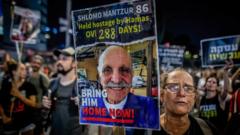In a significant development in the ongoing Israel-Hamas conflict, Hamas has returned the remains of four Israeli hostages as part of an intricate exchange deal, while Israel has commenced the release of over 600 Palestinian prisoners. The hostages – identified as Shlomo Mansour, 86, Ohad Yahalomi, 50, Tsachi Idan, 50, and Itzik Elgarat, 69 – were among those abducted during the violence that erupted on October 7, 2023. Israeli officials are currently conducting DNA tests on the returned bodies to verify their identities.
The prisoner release marks an end to the initial phase of a fragile ceasefire agreement expected to conclude on Saturday. The final exchanges hold significant implications as they involve the repatriation of Palestinian detainees, with many being reunited with jubilant crowds in the West Bank and Gaza. Among those released are over 400 individuals detained in connection to the ongoing conflict, including 50 serving life sentences. Public receptions for returning prisoners conveyed a mixture of celebration and sorrow, as many families marked both loss and reunion.
The handover process was marked by tensions, with Hamas opting for a private delivery of the bodies, contrary to prior public ceremonies that had drawn criticism from Israeli authorities. In a previous incident, Hamas had mistakenly returned the body of a Palestinian woman instead of the Israeli Shiri Bibas, which heightened tensions and accusations of mistreatment towards hostages during the handover.
While the immediate exchange is crucial, discussions on progressing to a second phase of the ceasefire – aimed at the release of remaining living hostages in return for more Palestinian prisoners – have yet to commence. The backdrop of this exchange is underscored by tragedy, as Israel recently held funeral services for three hostages who died in captivity amid the escalating violence that has claimed thousands of lives.
The situation remains fluid, with the prospect of extending the ceasefire and further negotiations looming over both parties as they navigate the complex and often painful realities of the ongoing conflict.
The prisoner release marks an end to the initial phase of a fragile ceasefire agreement expected to conclude on Saturday. The final exchanges hold significant implications as they involve the repatriation of Palestinian detainees, with many being reunited with jubilant crowds in the West Bank and Gaza. Among those released are over 400 individuals detained in connection to the ongoing conflict, including 50 serving life sentences. Public receptions for returning prisoners conveyed a mixture of celebration and sorrow, as many families marked both loss and reunion.
The handover process was marked by tensions, with Hamas opting for a private delivery of the bodies, contrary to prior public ceremonies that had drawn criticism from Israeli authorities. In a previous incident, Hamas had mistakenly returned the body of a Palestinian woman instead of the Israeli Shiri Bibas, which heightened tensions and accusations of mistreatment towards hostages during the handover.
While the immediate exchange is crucial, discussions on progressing to a second phase of the ceasefire – aimed at the release of remaining living hostages in return for more Palestinian prisoners – have yet to commence. The backdrop of this exchange is underscored by tragedy, as Israel recently held funeral services for three hostages who died in captivity amid the escalating violence that has claimed thousands of lives.
The situation remains fluid, with the prospect of extending the ceasefire and further negotiations looming over both parties as they navigate the complex and often painful realities of the ongoing conflict.












